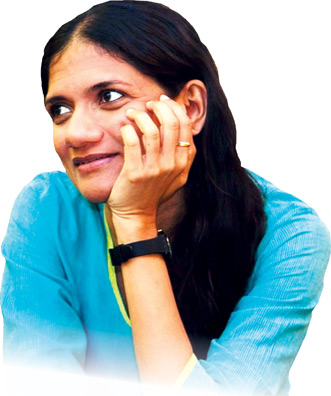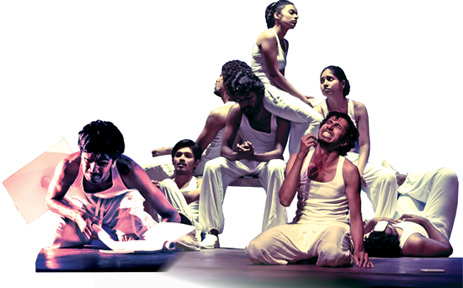|
 Drama review: Drama review:
Walking Path : Wordless theatre to the fore
By Dilshan Boange
Walking Path, a work of ‘wordless theatre’, directed by Jayampathi
Guruge and presented to theatregoers by ‘Stages Theatre Group’ was a
remarkable success as I observed on its opening night several months
ago.
It has the marked unconventionality of being void of a speech element
but speaks volumes to the viewers through a mode of performance that is
ripe with symbolism. The play will be staged at the Lionel Wendt Theatre
on November 21 and 22.
Theatre is a medium of entertainment and communication which can be
discussed from various perspectives. Ruwanthie de Chickera is a
well-known name in the sphere of Sri Lankan drama and is a pioneer of
the collective of independent artistes known as ‘Stages Theatre Group’.
Ruwanthie shared her thoughts and insights very lucidly in an interview
with Montage.
Excerpts:
Question: I watched Walking Path on the opening night at the
Wendt on July 26. It was a unique theatre experience and I observed that
in the audience there were a noticeable number of foreigners as well. I
thought it must be the nature of the play as a ‘wordless play’ that drew
in foreign viewers, since they were unlikely to see a Sinhala or Tamil
play. Between the first show and now how has the response been from
viewers? What sort of feedback has come your way following the debut of
Walking Path?
Positive response
Answer: By and large the response has been very positive. We
have had people who absolutely loved it, who swear by it, who think it
is the best, most exciting thing they have seen in ages, (some even said
best thing they have ever seen)... However, we have also had people who
hated it. Who thought it didn’t even qualify to be called theatre.
Since you brought up the issue of foreign nationals, I must say that
they didn’t seem to have any problem understanding the play.
In fact the play has been selected for a festival in Mumbai and the
festival jury, when they screened the play for selection, understood it
completely. They didn’t need any reference points.
Now that surprised me. I thought this play was one that was rooted in
a very particular context – this intense drive to facelift our cities
after the end of terrorism... but I guess the issues we address in the
play are ones being faced by citizen in other countries too…
Q: I hesitate to think that Walking Path is meant for the
typical mainstream theatergoer. But the audience on the opening night
did show a tremendously positive response. What sort of viewership does
this play address, in your opening? And why did Stages Theatre Group
undertake to support this work directed by Jayampathi Guruge?
A: I hesitate to define the ‘typical mainstream theatregoer’.
Colombo audiences have surprised me over and over again by what they
like and dislike. In fact some of the really strong reactions against
Walking Path have come from staunch theatre enthusiasts and some of the
most ardent supporters of the play have been people who came to the
theatre for the first time.
I believe it is a play that should be seen because it is so
different. Where you fall in your response to the play, is anyone’s
guess...
For the last 15 years Stages Theatre Group has (by default!) produced
only plays directed by me. We have wanted to break this trend for a long
time. We finally did.
Funding
We now have, within our group, others who are interested in directing
plays and we want to encourage them. Jayampathi is a new director with a
lot of potential. He has a keen and unique artistic vision and is on a
definite path of discovery as an artiste. It is always nice to support
an artiste like this – as opposed to someone who just wants to ‘do a
play.’
 Q: Theatre in Sri Lanka is not usually a money spinner that
practitioners can bank on as an avenue for income. How have you been
able to secure funding for the production? Q: Theatre in Sri Lanka is not usually a money spinner that
practitioners can bank on as an avenue for income. How have you been
able to secure funding for the production?
A: Finding money to produce theatre is extraordinarily
difficult. It should not be. Artistes spend more than 70 percent of
their energy running around begging for money to do their work. Even
artistes like me have been doing theatre for 15 years now, it never
seems to get any easier.
I don’t have the time to sit and think about the play we are doing,
as a director – none of us do. It's a colossal shame, truly it is, that
the arts are so poorly supported in our country.
I have travelled all over the world. In most other countries people
look after their artistes and they invest in them. They support them so
that they can do what they should be doing, concentrating on their art.
This is your loss (the audience) as much as it is ours. The theatre
you finally get, as an audience, is probably only about 40 percent of
what we can really give you, if we have the time and space to
concentrate on our art.
Our artistes are exhausted - and dispirited. We have to make it
easier for them. It is in everyone’s interest to do so.
The previous show of Walking Path ran at a loss. We struggled with
sponsorship. It has been the same story this time round. We finally
resorted to crowd sourced funding for the play. We are now raising money
through personal donations. I hope that it will work.
Though the money comes in much more slowly, it's a nice feeling when
your audience supports your work. Every donation, however small, lifts
our spirits. It shows us that people value our work.
If we can slowly build a culture of philanthropy of the arts –
support of our artistes coming from our people itself – I think we will
be achieving something that is more than just financial sustainability
of the arts.
We will be creating strong bonds of faith between artistes and
society. A responsibility that runs both ways. Through this comes a
strong and vibrant industry that will protect and nourish its artistes
and feed the growth of society, through human imagination and
creativity. It's one of the hallmarks of civilised society, isn’t it?
Politics
Q: How would you describe the politics behind this particular
work of theatre? Would you agree with me if I say that it has a strong
anti-establishment vein in it?
A: The play was created through observing human behaviour on
the Walking Paths of the city. It is what we saw. We present to you snap
shots of public life. And what we see is what everyone sees, because it
is public behaviour.
We have taken these moments, framed them, crafted them and we are
presenting them back to you. The way people behave – what they do, don’t
do, are allowed to do and are not allowed to. Because we don't’ even use
any words, these situations remain open for interpretation.
It is interesting that the question of ‘establishment’ even arises in
this situation, isn’t it? Essentially what we have done is that we
created a play about the parks of the city.
If showing what goes on in the places of public recreation, raises
questions of the establishment, then we need to ask ourselves, what on
earth is the establishment doing in our parks in the first place? That
is the deeper problem that we need to address, isn’t it?
All we have done is to create a play about the parks, the walking
paths of the city. We present to you what we see.
If it looks ridiculous or dangerous then its probably safe to say
that the problems and dangers exist.
Q: Do you feel that Jayampathi Guruge has ‘set the stage’ for
more wordless works of theatre to follow with other Avant Garde young
theatre practitioners or will Walking Path remain as one of a kind?
A: I hope so. I am now interested in this kind of theatre. I
think you will see more of it.
We stumbled upon the ‘no words’ form of the play. It arose out of the
process. It was something that rang true to the particular situation we
were working on.
We spent a lot of time observing people on the Walking Paths and of
course we could not hear what they were saying, though we could see
everything they were doing.
This is how we found the language of the play. This is how we find
the language to all our plays. We work very hard to find the form of
expression that most perfectly fits what we are trying to say.
The ‘observing silent human behaviour’ from a distance is very much
the language of the Walking Paths. It’s such an interesting social
situation – how these places are so private and so public at the same
time.
Everything is seen, everything is communicated, everything is
understood, though nothing is said. Everything is abided by. People
watching people. And others watching them. It's a fascinating situation.
It's like a human zoo. And we all seem to be ok with it. |

